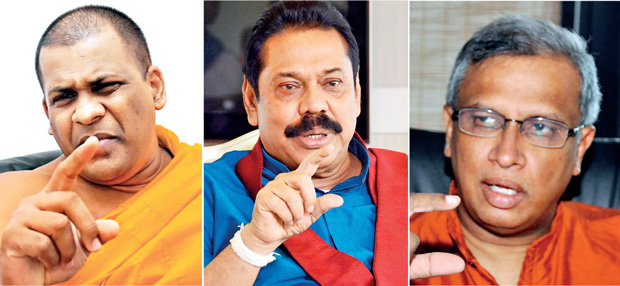Reply To:
Name - Reply Comment
Last Updated : 2024-04-25 06:31:00
 Malwatte, Asgiriya, were silent when Gnanasara was on a rampage, two years ago
Malwatte, Asgiriya, were silent when Gnanasara was on a rampage, two years ago
Unfortunately, our Buddhist clergy seems to be still living in the past
Gnanasara managed to dominate the media through a series of protest marches, manhandling and uttering utter filth as his basic lingo
In one of the greatest contributions to parliamentary history, M. A. Sumanthiran’s address on the debate on the 18th Amendment deserves a special place.
When politics become entrenched in ethnic and religious shades, governance also becomes entrapped in the same gory and muddy trenches
“A really efficient totalitarian state would be one in which the all-powerful executive of political bosses and their army of managers control a population of slaves who do not have to be coerced, because they love their servitude.”
~Aldous Huxley, Brave New World
Prior to the last Presidential Elections in 2015, the Rajapaksa clan tried a fast one. And it backfired. Galagodaaththe Gnanasara, who is more akin to a street thug-clad-in-saffron robes in search of a cause to push his own ego and those of whom he had vowed to place on the throne than a layman  who has renounced a greed-ridden life. Even though his caste, which is the critical factor in being qualified to be ordained under the Malwatte Chapter of Siam Nikaye, was a shady feature of the man, by sheer force of the personality Gnanasara managed to dominate the media coverage at the time through a series of gung-ho cavalcade of protest marches, manhandling and uttering utter filth as his basic lingo, he managed to enter into the psyche of the majority of the Sinhalese Buddhists who themselves had found a cause to identify with.
who has renounced a greed-ridden life. Even though his caste, which is the critical factor in being qualified to be ordained under the Malwatte Chapter of Siam Nikaye, was a shady feature of the man, by sheer force of the personality Gnanasara managed to dominate the media coverage at the time through a series of gung-ho cavalcade of protest marches, manhandling and uttering utter filth as his basic lingo, he managed to enter into the psyche of the majority of the Sinhalese Buddhists who themselves had found a cause to identify with.
By choosing to amend the Constitution through an urgent Bill, the entire process of reform has been expedited
Defeat of the Liberation Tigers of Tamil Ealam (LTTE) provided that cause. The growing triumphalism coupled with deliberate desecration of the political culture by the then rulers, the Rajapaksa clan, supplied the impetus to this increasingly polarizing socio-ethnic phenomenon. Their propaganda machinery went into full gear and began branding everyone who opposed them as unpatriotic. The image or portrayal of an image of an unpatriotic or traitorous person could be devastating to military officers or those who have retired from the armed forces. That was what happened to Sarath Fonseka.
The Bodu Bala Sena (BBS) militants, a fundamentalist Sinhalese Buddhist action group, in order to muster the support of an extremely racist and religiously obedient to the Mahawansa and its glory-descriptions of the Kings of ancient times, towards a sizeable segment of our voting population, took to the streets immediately after the cessation of military action. Their battle cry was a broad-based message founded on numbers. Here are the latest numbers:
Sri Lanka Demographics Profile 2017 Ethnic proportion:
Sinhalese 74.9%,
Sri Lankan Tamils 11.2%,
Sri Lankan Moors 9.2%,
Indian Tamils 4.2%,
Others 0.5% (2012 est.)
Religious proportion:
Buddhist (official) 70.2%,
Hindu 12.6%,
Muslim 9.7%,
Roman Catholic 6.1%,
Other Christian sects 1.3%,
Others 0.05% (2012 est.)
(Source: CIA World Factbook)
In order to secure a realistic and firm hold of the majority of the voting population, if the objective is to form a government, the pundits of the MR-led Sri Lanka Freedom Party and its satellite parties theorized that they could completely disregard the minorities and ensure an impregnable firewall with an overwhelming majority of the Sinhalese-Buddhist vote. All this happened soon after MR defeated Sarath Fonseka in 2009. With the subsequent victory at the parliamentary elections in 2010, they were further encouraged and insisted on adhering to this base-instinct-based argument that a firm and solid voter bloc of Sinhalese Buddhists would suffice to secure future election victories. This theory of Sinhalese Buddhist majority-based belief was at the core of their introduction of the 18th Amendment which erased the term limit on election for the office of President. Although this amendment to our Constitution unquestionably lent a legal basis for MR and his family to perpetuate rule over Sri Lanka, the ethical and moral arguments that cascaded in the wake of the easy passage of the 18th Amendment were many and divergent in their content.
In one of the greatest contributions to parliamentary history, M. A. Sumanthiran’s address on the debate on the 18th Amendment deserves a special place. Amidst a cacophony of disturbances and heckling emanating from the government-benches, Sumanthiran delivered a masterpiece. Quoting a statement issued by some leading academics at the time, Sumanthiran said thus: ‘By choosing to amend the Constitution through an urgent Bill, the entire process of reform has been expedited, if not short-circuited, and no room has been left for any kind of public debate let alone public consultation. Under a Constitution that explicitly recognizes the “Sovereignty of the People” that process is not acceptable, especially when no convincing reasons have been given as to the need to expedite this process. Indeed, the most distressing aspect to this whole process is the lack of interest in government ranks on the need to raise awareness, let alone build consensus, among the general public on the need for such urgent reform.’
The unusual rush applied by the MR government to facilitate passage of the Bill was a clear indication of the ill-faith with which the Bill was introduced. This is the time the so-called custodians of Buddhism could have risen to the occasion and taken a stand on the side of the masses. Instead they unleashed the notorious thugs of the BBS. Both Chapters of the Siam Nikaya, Malwatte and Asgiriya, were conspicuously silent when Gnanasara was in full rampage a couple of years ago. They refused to condemn him and in a vicarious sense, they condoned his deplorable and obscene public and private conduct. Buddhist clergy and its hierarchy is built in such a way, its flexibility was used as an excuse to stay silent on matters of monk-discipline. In other words, the crude exercise of quietude when the very fundamental teachings of the Teachings were challenged, the Heads of the Sanga Sasana opted to side with the ‘fundamentalists’ of a different kind, of the modern day 21st century variety.
Now those fundamentalist propensities are being openly represented by the two Chapters of the Siam Nikaya and other heads of the Ramanna and Amarapura Nikayas. Their wilful engagement in the process of the debate on the new Constitutional changes is not only old and hackneyed; it’s dangerously close to interfering in secular affairs of government. Secularity in governmental matters is profoundly significant in that negation of secularity would mean, especially in the context of a democratic pluralistic society such as Sri Lanka, what was relevant in dictatorial monarchs as was in ancient Ceylon during the reigns of Kings and Queens, is not applicable any more. Even during such reigns, according to Chanakya, arguably the first ever social scientist known in human history, the fundamental function of a ruler is to make his people ‘fearless’. The very construction of a monarch goes against such principles of secularity and all sense of objectivity and ‘consensus’ element of democracy, a system of government that developed over the last three centuries.
Whether one likes it or not, we are committed to the basic principles of democracy and safeguards of basic human rights as pronounced in the Universal Declaration of Human Rights by the UN General Assembly in 1948. We should not be swayed by parochial propensities of tribal instincts. What was most relevant and applicable to a monarchical rule should not be allowed to prevail upon a much more acceptable and wiser way of governance, social intercourse and civilized life and thought. Buddhism taking pride of place during the days of our Kings is not only more acceptable at the time, it was more natural. But when Ceylon gained Independence, the country was not only freed of the colonial shackles that bound itself to the British Raj, it also graduated from a feudalistic socio-economic way of life into a fully-fledged democracy in which governments are elected and rejected by the people by virtue of the Universal Franchise granted unto it in 1931.
Unfortunately, our Buddhist clergy seems to be still living in the past and that was mainly facilitated by the 1972 Constitution that granted ‘Special Status’ to Buddhism. The irony of this ‘Special Status’ is that when such special provision is written into the Constitution, it is impossible to take it away, specifically in the context of democratically elected governance. These nuanced arguments are beyond the average rural voter. Not that they are not learned enough to digest such Sophisticated Constitutional Affairs of the government, but that they simply do not have time to think of such matters that they think are out of the realm of material value to them. Besides, their allegiance to the Dharma is grossly understated by the Colombo-living pundits. Whether their allegiance is profoundly philosophical or abjectly superficial, the faith in ‘the land, the faith and the race’ is however ungainly, is deep-rooted and unshakeable.
What was ominously initiated by Galagodaaththe Gnanasara is now being ordained by the Highest of the High Monks in the Buddhist clergy. The hue and cry about a Muslim invasion of the local businesses and legitimate Tamil rights would result in Sri Lanka becoming a satellite of Pan-Tamilism, has become a very justifiable grievance of the ‘majority’. When politics become entrenched in ethnic and religious shades, governance also becomes entrapped in the same gory and muddy trenches. That is why no advance in the sphere of ethnic harmony and religious tolerance is visible in the near future.
The writer can be contacted at vishwamithra1984@gmail.com

Add comment
Comments will be edited (grammar, spelling and slang) and authorized at the discretion of Daily Mirror online. The website also has the right not to publish selected comments.
Reply To:
Name - Reply Comment
US authorities are currently reviewing the manifest of every cargo aboard MV
On March 26, a couple arriving from Thailand was arrested with 88 live animal
According to villagers from Naula-Moragolla out of 105 families 80 can afford
Is the situation in Sri Lanka so grim that locals harbour hope that they coul